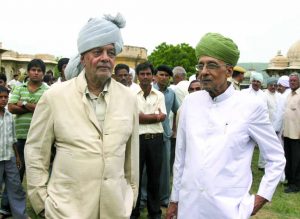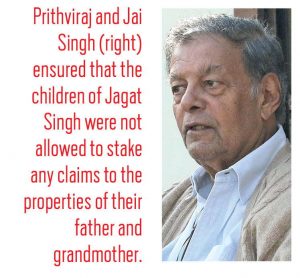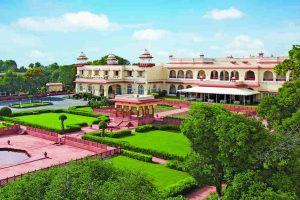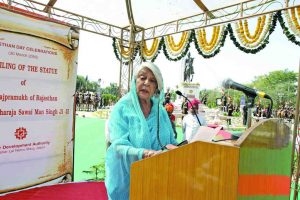The prolonged feud over the five-star heritage hotel properties of the royals has been settled by the Supreme Court, but the palace intrigue continues
~By Prakash Bhandari in Jaipur
India’s erstwhile royal families have left us with memories of fantasy lifestyles, fabled riches, grandeur and romance, and, inevitably, family disputes over the opulent palaces and properties they owned. The Gaekwad royals battled each other over ancestral property worth Rs 20,000 crore till the claimants hammered out a settlement in court, ending a 23-year-old family feud. Descendants of Maharana Pratap fought a protracted legal battle over a Rs 450 crore legacy that includes Udaipur’s iconic Lake Palace hotel. The dispute (shades of Bahubali 2), involved two feuding brothers, one backed by the mother; the two sides were entangled in 55 different cases. The legal war is still on. The Scindia royals battle also witnessed the son (Madhavrao) taking on his mother (Rajmata Vijaya Raje) in court. The legal battle was prolonged when Madhavrao’s son, Jyotiraditya, filed cases against his paternal aunts, Rajasthan chief minister Vasundhra Raje and her sister Yashodhara Raje, over the family inheritance. The Scindia property is worth Rs 25,000 crore, and there are 50 cases in various courts.

Then there is the battle of Jaipur. Perhaps no other legal slugfest exemplifies the kind of palace intrigue, polygamy, succession drama and complex inheritance structure like that of the House of Jaipur. Among India’s near-mythical panoply of royal houses, Jaipur was the best known and certainly among the richest. While the legendary Maharani Gayatri Devi, widow of Maharaja Sawai Man Singh II, was alive, the inheritance issue and the intrigue, was kept in check. When she died, in 2009, the legal skeletons tumbled out of the royal closets, bringing into the open the messy, three-decade-old inheritance battle.
The legal contest involves the magnificent Rambagh Palace and the sprawling 18-acre Jaimahal Palace in Jaipur, and Sawaimadhopur Lodge in Ranthambore. The estimated value of Jaimahal alone is Rs 1,000 crore.
COMPLICATED TIES
Gayatri Devi was Maharaja Sawai Man Singh’s third wife, and she had just one son, Jagat Singh, who spent most of his life in London. The inheritance issue is contested by two sides of the family—Prithviraj and Jai Singh (brothers born to the same mother and Jagat Singh’s stepbrothers), and Devraj Singh and Lalitya Kumari, Jagat Singh’s son and daughter from a Thai princess he met and married in London at a ceremony attended by the Queen and Lord Mountbatten. Devraj and Lalitya were grandson and granddaughter of the late Rajmata, as Gayatri Devi was called. Jagat Singh died in 1997; he was one of the four sons of Sawai Man Singh.

In fact, the original legal dispute pitted Jagat Singh, and later Gayatri Devi, against Bhawani (Bubbles) Singh, the son of Sawai Man Singh’s first wife, Marudhar Kunwar.
Gayatri Devi’s death, 12 years’ later, triggered a legal showdown between Devraj and Lalitya and their step-uncles. The half-Thai members of the family have mostly lived in Bangkok, and still do after Jagat Singh’s fondness for drink and partying led to Priyanandna divorcing him. He moved back to London where he died. However, Devraj and Lalitya continued to visit Jaipur to see their grandmother, and usually stayed at the lovely Jaipur City Palace.
When Maharani Gayatri Devi died, in 2009, the legal skeletons tumbled out of the royal almirahs, bringing into the open, the messy, three-decade-old legacy war
On Jagat Singh’s death, they inherited the Jai Mahal Palace under the laws of succession. But as the siblings were minors, Jagat Singh’s step-brother Prithviraj was appointed the palace caretaker. When the Jai Mahal Palace was converted into a luxury hotel, the succession certificate, according to Devraj, gave them the right to 99 percent equity and Prithviraj one per cent. That is when the palace intrigue started, with the young Thai-born family members claiming the uncle was manipulating shareholding and the control of the royal properties.
They said that Prithviraj was trying to prove that Jagat Singh had revoked his children’s succession rights through a will—a probate of which is pending in the civil court.
LEGAL VICTORY
The matter currently rests with the Company Law Board. Jagat Singh’s original will, in fact, had bequeathed his shares in the royal properties to his mother. In turn, Gayatri Devi willed her and her son’s properties in the name of her two grandchildren. The step-uncles disputed the first will written by Jagat Singh but after multiple hearings, the grandchildren won a tactical legal battle in the Supreme Court which upheld the Delhi High Court’s order in their favour, saying that they had been deprived of their rightful share in Rambagh Palace and Jaimahal Palace. These two properties are owned by the Jaipur royals, but managed by Tata’s Indian Hotels Ltd, branded as the Taj Hotels Resorts and Palaces.
 The succession battle over the royal properties estimated to be worth $900 million (Rs 6,000 crore) according to a British assessor, seemed to have been settled when the Supreme Court laid down that Jagat Singh only disinherited his estranged wife and not his children. However, various members of the Jaipur royal family still exerted control over the extensive royal estate which remained partially intact long after the merger of Indian princely states into the Indian Union in 1947. Prithviraj and Jai Singh had ensured that the children of Jagat Singh were not allowed to stake any claims to the properties of their father and grandmother, till the Supreme Court stepped in and ruled in favour of Devraj and Lalitya.
The succession battle over the royal properties estimated to be worth $900 million (Rs 6,000 crore) according to a British assessor, seemed to have been settled when the Supreme Court laid down that Jagat Singh only disinherited his estranged wife and not his children. However, various members of the Jaipur royal family still exerted control over the extensive royal estate which remained partially intact long after the merger of Indian princely states into the Indian Union in 1947. Prithviraj and Jai Singh had ensured that the children of Jagat Singh were not allowed to stake any claims to the properties of their father and grandmother, till the Supreme Court stepped in and ruled in favour of Devraj and Lalitya.
DIVORCED WIFE

When in Jaipur, Devraj, 34, lives in Lilypool, which used to be the residence of the late Gayatri Devi. Sawai Man Singh had given this French-style bungalow to her on a 99-year lease and Devraj says he has documents to prove it. This beautiful bungalow is part of the Rambagh Palace Hotel. Devraj, having lived in London and Bangkok, has very little knowledge of the Indian legal system and succession documents, further hampered by the fact that he cannot speak or read Hindi. Often his sister, Lalitya Kumari, 37, who is married to a Thai businessman and lives in Bangkok, comes and stays with him. Their motivation and advice comes from their mother. Once she divorced Jagat Singh, he left her out of his will but his children retained their right to inheritance. She has been the invisible force behind their fight for their rights.
The Supreme Court ruling came as a relief but it is unlikely to be a smooth transition. Prithviraj was not available for comment, but one of his lawyers said that the step-uncles would abide by the Supreme Court orders. Despite that reassurance, royalty generally plays by its own rules and traditions. Both the step-uncles are in their late seventies and Devraj squarely blames them, Prithviraj in particular, for refusing to transfer the shares. “My uncle Prithviraj has attempted various ways to disinherit us. He had already illegally reduced our father’s shareholdings from 99 percent of Jaimahal Palace to 7 percent. Even Dadisa (Gayatri Devi) was not aware of this. Prithviraj also diluted my father’s shares in Rambagh from 27.06 percent to 4.74 percent. After I found out, I filed the case in the Company Law Board in 2006. We also suddenly discovered that we have been disinherited.”

Palace intrigue has led to this situation. Ironically, it was the late Maharaja Bhawani Singh, popularly known as Bubbles, who encouraged the siblings to fight for their rightful share in their father’s and grandmother’s properties. He was witness to the will that Gayatri Devi wrote in favour of her grandchildren which proved a turning point in the royal dispute. The legal focus, however, is on the three properties managed by the Taj group. Devraj and Lalitya still have to obtain an order from the Company Law Board on the new shareholding structure in the two companies that run the Rambagh Palace Hotel, Hotel Jaimahal Palace and Sawaimadhopur Lodge. If the Board decides in their favour, the siblings can then inform the Taj Group of the new shareholding, originally held by their late father. In effect, Devraj and Lalitya will be the new owners of the five star properties. Considering there are other court cases involving various members of the royal family, the Battle of Jaipur still awaits a victor.


